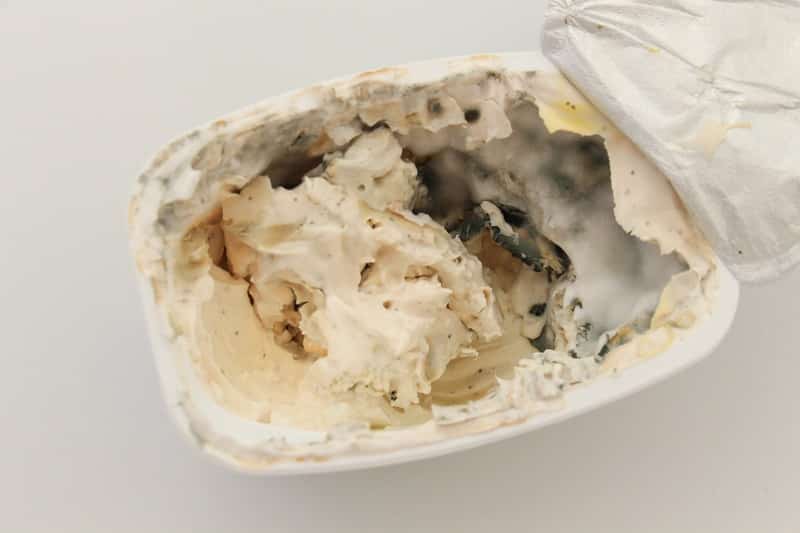
What would we do without cream cheese? It’s the main ingredient in cheesecake and the perfect spread for bagels. From dips to sandwiches and frosting, some of us use it every day.
However, being a fresh dairy product, cream cheese does have a limited shelf life and once opened, can spoil fairly quickly.
Always check the expiry or “best before” dates on the tub when purchasing and buy the freshest cream cheese you can find. Also, once you get it home, keep it refrigerated at all times.
The Philadelphia Cream Cheese company gives these guidelines:
“If kept refrigerated at all times, an unopened pack of cream cheese will last for a month after the ‘Best when Purchased By’ date on the package. After it has been opened, the cheese must be used within ten days.”
Effects of Eating Spoiled Cream Cheese
Eating spoiled food of any description is not something that anyone should be doing. However, it isn’t always something you’re aware of until it’s too late.
Perhaps you went to a party and ate some of the snacks. You thought at the time that they tasted a little strange but only later did you think that perhaps the cream cheese was off.
What Will Happen If You Eat Spoiled Cream Cheese?
Although cream cheese is in essence “sour milk”, that doesn’t mean it’s gone bad. All dairy products nowadays are pasteurized to destroy most germs, but that doesn’t mean they’re all killed.
Lactose (the type of sugar in milk) provides a good medium for bacteria to grow and multiply.
Eating a small amount of spoiled cream cheese is unlikely to do any harm but a larger amount can cause a host of unpleasant digestive issues like stomach cramps, nausea, vomiting, and even diarrhea. Most of the time, these symptoms go away on their own after a day or so.
During that time, the main thing is to prevent becoming dehydrated by sipping small amounts of fluid frequently or sucking ice blocks. You could also try oral rehydration fluids.
It’s not a good idea to take anti-diarrhea medicines for this because your body needs to eliminate the cause of the problem.
How to Tell if Cream Cheese is Spoiled?
There are many ways to tell if the cream cheese is spoiled – your senses will alert you if there’s a problem:
Using your senses will be the best technique to check if your cream cheese has gone bad, so you can minimize the health risks. Here are a few signs of spoiled cream cheese.
- Smell – Fresh cream cheese has a mild, milky smell that’s light and pleasant. Expired cream cheese smells sour, pungent, and generally nasty.
- Touch – Fresh cream cheese is silky, smooth, and creamy. Off cheese is grainy, slimy, or may even be dry and chalky.
- Sight – Fresh cream cheese has a beautiful white or creamy color. If it turns yellow or there are patches of blue, green, or grey mold on it, throw it out!
- Taste – Hopefully your other senses will help you identify bad cream cheese but if you do happen to taste it, here’s what you’ll sense. If it tastes strong or unpleasant in any way, don’t eat it.
- Trust your instinct – Never be afraid to subtly get rid of a piece of food at a party that you think has a problem. Cream cheese should not have a strong, sour, or pungent flavor.
Correct Storage of Cream Cheese to Prevent it from Going Off
Being a fresh dairy product, cream cheese has a limited shelf life and even the best storage methods can do nothing about that. However, you can get the maximum life possible by following these hacks:
- Proper storage starts in the grocery store. Buy your dairy products last before heading to the cashier. Always take a cooler along with you and put your dairy products (and meat) inside it as soon as you have paid for them.
- Never leave cream cheese at room temperature for longer than 2 hours.
- Once home, put the cheese into the fridge at 40˚F (4.4˚C) or less.
- Keep it in its original packaging until it is opened.
- After opening, you can put the foil block into a Ziploc bag or airtight container.
- Cream cheese can be frozen but it becomes crumbly and grainy on thawing. This makes it unsuitable for many uses.
- If you have leftover cream cheese frosting, you can store it in the refrigerator in an airtight container but only for three days. It cannot be frozen as the texture spoils.
We hope our article has enlightened you about eating spoiled cream cheese. Trust your senses and stay healthy!


